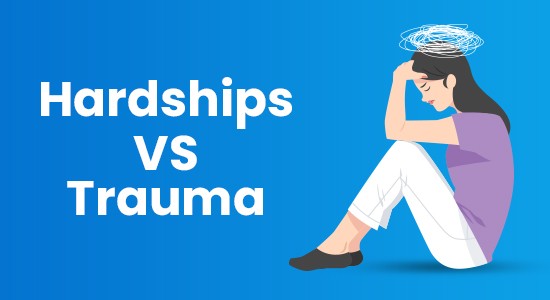Hardships VS Trauma
Hardships VS Trauma
Hardships and trauma are two concepts often intertwined, yet they possess distinct characteristics and implications for individuals’ psychological and emotional well-being. While both involve challenges and difficulties, understanding their differences is crucial in providing appropriate support and navigating the complexities of human experiences.

Hardships
Hardships refer to the difficulties and adversities that individuals encounter throughout their lives. These can encompass a wide range of challenges, such as financial struggles, academic setbacks, relationship issues, or work-related stress. Hardships are a natural part of life and can vary in intensity and duration. They may lead to feelings of frustration, sadness, and temporary discomfort. However, hardships generally do not result in the profound disruption of one’s sense of self or fundamental beliefs about the world.
People often develop coping strategies to navigate hardships. These strategies can include seeking social support, problem-solving, and utilizing personal strengths. Overcoming hardships can foster resilience and personal growth, as individuals learn to adapt and develop new skills to manage challenges.
Trauma
Trauma, on the other hand, is a more complex and deeply distressing experience. It results from exposure to events or situations that overwhelm an individual’s ability to cope and leave a lasting psychological and emotional impact. Traumatic events can include physical or emotional abuse, natural disasters, accidents, or acts of violence. What distinguishes trauma from hardships is its potential to shatter a person’s sense of safety and coherence.
Trauma can lead to various psychological responses, such as flashbacks, nightmares, hypervigilance, and avoidance of reminders of the traumatic event. These responses are part of a survival mechanism that persists long after the traumatic event has passed. Post-Traumatic Stress Disorder (PTSD) is a well-known condition that can emerge following exposure to trauma.
Professional intervention, such as therapy, is often necessary to help individuals process and heal from trauma. Trauma-informed care involves understanding the effects of trauma on a person’s behavior and emotions and creating a safe environment that fosters healing and recovery.

Differentiation and Impact
While both hardships and trauma involve difficulties, their impact on an individual’s well-being differs significantly. Hardships, while challenging, are typically temporary and do not fundamentally alter a person’s perception of themselves or the world. In contrast, trauma can have profound and lasting effects on one’s mental health, relationships, and overall quality of life.
Recognizing the distinction between hardships and trauma is essential in responding appropriately. Offering support and understanding during times of hardship can strengthen relationships and promote personal growth. In cases of trauma, a compassionate and trauma-informed approach is vital, as individuals may require specialized care to heal from the deep wounds left by traumatic experiences.


